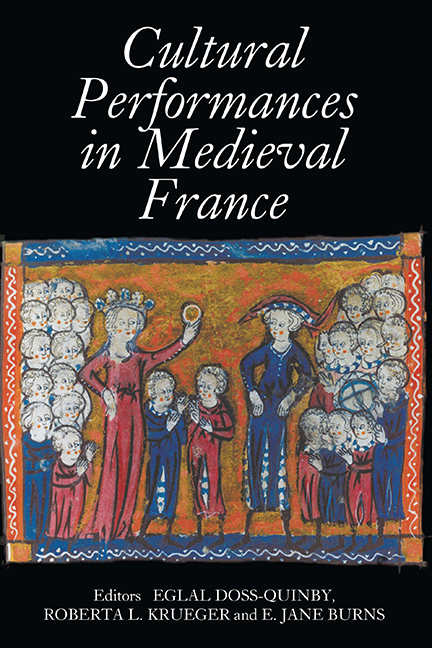Book contents
- Frontmatter
- Contents
- List of Illustrations
- Contributors
- Introduction
- Nancy Freeman Regalado, Curriculum Vitae
- PART I POETIC AND MUSICAL PERFORMANCES
- La poésie comme récit
- Colin Muset and Performance
- Subtilitas and Delectatio: Ne m'a pas oublié
- “Flables couvertes”: Poetry and Performance in the Fifteenth Century
- PART II PERFORMING SEXUAL AND SOCIAL IDENTITIES
- PART III DEVOTIONAL PRACTICE AND TEXTUAL PERFORMANCE
- PART IV PERSUASIVE PERFORMANCES
- PART V RE–ENACTMENTS AND LEGACIES
- Tabula Gratulatoria
- Tabula Gratulatoria
“Flables couvertes”: Poetry and Performance in the Fifteenth Century
from PART I - POETIC AND MUSICAL PERFORMANCES
Published online by Cambridge University Press: 24 October 2017
- Frontmatter
- Contents
- List of Illustrations
- Contributors
- Introduction
- Nancy Freeman Regalado, Curriculum Vitae
- PART I POETIC AND MUSICAL PERFORMANCES
- La poésie comme récit
- Colin Muset and Performance
- Subtilitas and Delectatio: Ne m'a pas oublié
- “Flables couvertes”: Poetry and Performance in the Fifteenth Century
- PART II PERFORMING SEXUAL AND SOCIAL IDENTITIES
- PART III DEVOTIONAL PRACTICE AND TEXTUAL PERFORMANCE
- PART IV PERSUASIVE PERFORMANCES
- PART V RE–ENACTMENTS AND LEGACIES
- Tabula Gratulatoria
- Tabula Gratulatoria
Summary
The late medieval lyric is, says Jacqueline Cerquiglini-Toulet, “une pratique sociale”; everyone agrees that in the fifteenth century anyone with the remotest pretensions to social standing – anyone, that is, who aspired to being thought of as joyeux, joly, and gracieux – was expected to be able to turn a neat rondeau or a witty ballade. The adjectives I have just used come from the account in his biography of Boucicaut's social education: he was, it says, trained in the art of composing balades, rondeaux, virelais, lais et complaintes d'amoureux sentement. Charles d'Orléans, on Saint Valentine's day, could call his court to the composition of rymes en françoys ou latin with every confidence that they could respond to the call; when the Duke of Suffolk was sick in Paris, the best remedy was for his courtiers to compose diz amoureux for his delectation; Queen Margaret of Scotland is said to have spent long nights composing rondeaux; and a couple of bourgeois, having competed in one of the characteristically louche seductions in which the Cent nouvelles nouvelles take such questionable pleasure: “mesmes firent de tres bons rondeaulx, et pluseurs chansonnettes, qu'ilz manderent et envoyerent l'un a l'autre, dont il est aujourd'uy bruit, servant au propos de leur matere dessus dicte…” (were able to put together rather good rondeaux, and a number of chansonnettes, which they exchanged one with another and which dealt with the events described above; these poems are still remembered).
Often, this is taken to mean that the composition of rondeaux and ballades was something undemanding and facile – and this is an image that late medieval accounts of the production of verse often seem to encourage. Froissart's Meliador, for instance, projects lyric-making with airy carelessness: many of the fixed-form lyrics that he weaves into this long romance are, the fiction pretends, thrown together by some knight riding cheerfully across the countryside (“Melyador fist… / Sus le chemin qu'il chevaucoit, / Une balade…” [As he rode along, Meliador composed a ballade; 15667–69]), or drinking at a spring (“Melyador se rafresci / De l'aigue, car moult faisoit chaut, / Et puis si commença en hault / A chanter…”
- Type
- Chapter
- Information
- Cultural Performances in Medieval FranceEssays in Honor of Nancy Freeman Regalado, pp. 45 - 54Publisher: Boydell & BrewerPrint publication year: 2007

